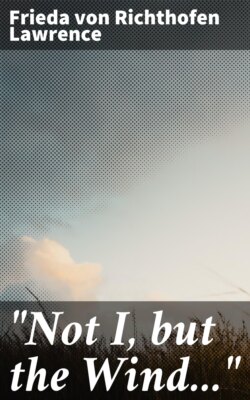Читать книгу "Not I, but the Wind..." - Frieda von Richthofen Lawrence - Страница 36
На сайте Литреса книга снята с продажи.
ОглавлениеVilla Igea
Villa di Gargnano
Lago di Garda (Brescia)
10 Feb. 1913
Dear Else:
You don’t expect me to stay here, gaping like a fish out of water, while Frieda goes careering and carousing off to München, do you? Je vous en veux.
About the article—Frieda is a nameless duffer at telling anything—the English Review—a shilling monthly, supposed to be advanced and clever—asked me to write an article on modern German poetry—about three thousand words. It is the modern, new stuff they want to hear about—say that which is published in the last ten years—such people as Dehmel, and Liliencron, Stefan George, Ricarda Huch, Elsa Laska Schule. Haven’t you got a strong opinion about modern German poetry—pottery, as father calls it? Well, do write about what you think—say Dehmel is ranty and tawdry, if you like, but don’t be too classical. If you like, the English Review will listen with great respect to dithyrambs on beautiful printing and fine form in book issuing.
It will adore tendency, and influences. And for heaven’s sake, put in plenty of little poems or verses as examples.—It would be rather a cute idea to write about: “The Woman-Poets of the Germany of Today” or “The Woman-Poets of Germany Today.”
It would fetch the English Review readers like pigeons to salt. And surely Die Frau has got articles on the subject. I should love doing it myself if I knew enough about it. (Nicht wahr—I have reviewed, in England, two anthologies of modern German Poetry.)
Do write about the women—their aims and ideals—and a bit about them personally, any you know and how they’d rather paint pictures than nurse children, because any motherly body can do the latter, while it needs a fine and wonderful woman to speak a message. Didn’t somebody tell you that? Did she have red hair? Put it all in.
“The Woman-Poets of Germany Today,” it sounds lovely. Do write it in German—I can read your letters quite easily, because you don’t write in Gothic hieroglyphs.
It is beautiful weather here. We are finding the first violets. There are bunches of primroses everywhere, and Leber Blumen, lovely little blue things, and lilac-coloured crocuses. You must come, you would love it, and we should feel quite grand having you for a visitor.
Mrs. K ... has written, forwarding a lawyer’s letter which was sent to E ... , and which says: “We should advise Professor W ... to refer Mrs. W ... to the Court, pending the divorce proceedings. Any request she had to make concerning the children, should be made to the Court.” That of course necessitates the engaging of a solicitor.
Frieda says, it is too long to let the children wait another six months without seeing her—they would become too much estranged. Perhaps that is true. Heaven knows how we are going to untangle these knots. At any rate the divorce is going forward; in England, after the first hearing, the judge pronounces a decree nisi—that is, the divorce is granted unless something turns up; then at the end of the six months the divorce is made absolute, if nothing has turned up. Then Frieda is free again. Till the divorce is absolute, E ... must have nothing to do with Frieda. So arrangements should be made through lawyers. But the children have holidays only at Easter, and can anything be settled before then? We shall have to see. This is to put you au courant. Send that wonderful book, do. The sixty francs have come.
Frieda is sending a picture that I want to have framed for Prof. Weber at Icking, but she says it is for you. And a thousand thanks.
D. H. Lawrence
